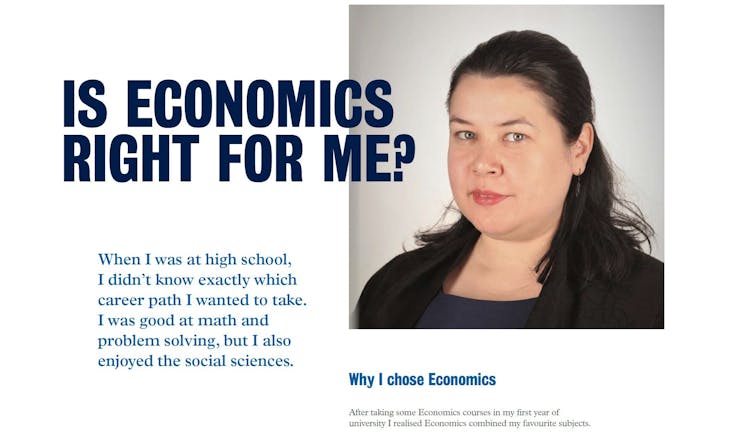Why women in economics have little to celebrate
- Written by Duygu Yengin, Associate Professor of Economics, University of Adelaide
International Women’s Day is a good time ask two critical questions about economics: do we have enough women in it, and does it matter?
Women are less likely to take it up than they used to be.
Twenty five years ago around half of the students studying Year 12 economics were female[1]. Today it is only around one third. In universities, only about 20% to 30% of undergraduate economics are female.
In public sector, one third of the economists in senior management roles are women. In academia it is far worse: fewer than 10% of economics professors are women, compared of 20% of professors in science, technology and maths[2].
Here’s why it matters:
Around half of the customer base for most businesses are women, and around half of our citizens and voters are women. Government and business decisions can affect women and men differently. If economists are mainly of one gender they are likely to miss things.
More generally, research[3] finds that diversity among decision makers leads to better decisions.
Even though the models and methods economists use are gender-neutral (at times inappropriately so), the types of questions economists choose to analyse are not. Greater diversity will lead to a greater diversity in the topics being examined.
There’s little doubt that male and female economists do things differently.
New research finds that female central bankers[4] work with greater independence and deliver lower inflation than male central bankers.
A study of US economists finds that male and female economists differ significantly[5] in their approach to the fields of health, labour markets, taxation, environment, government spending on welfare or military.
Why so few women study economics
It’s partly a function of it being a male-dominated discipline. Study after study[6] finds that when both man and women receive low grades in a discipline dominated by men, it is the women who are the most likely to drop out.
Another study[7] finds that when men and women of equal mathematical ability are asked to rate their ability, women rate it less highly than men.
Their teachers rate them worse too. Letters of recommendation[8] for women tend to be shorter and focus more on personality traits and less on skills or intellect than those for men.
The effects are weaker when women have female teachers. Role models[9] matter.
And women are more likely to study economics when they are told about its real life impact. University outreach[10] can help.
 Outreach material.
University of Adelaide[11]
Outreach material.
University of Adelaide[11]
Why academia leaks
The gender gap gets worse the higher women attempt to progress.
Some economists think this is not a problem: if there aren’t many women at senior levels in the field, it must be because they’re not very interested or not very productive.
It is a simplistic view that ignores the drivers of apparent productivity. Women are more likely than men to be given teaching and un-promotable administrative duties at the cost of research time.
They find it harder than men to find co-authors to write academic papers[12].
When they do, it matters less. One study[13] finds that co-authorship for a man has the same impact on tenure as writing a paper a solo, but not for a woman.
And female solo-authored economics papers are held to higher standards[14] than those written by men, delaying publication by as much as six months, and resulting in fewer successful publications.
Student evaluations[15] also suffer from unconscious bias. Students rate online teachers more highly when they they use male names than female names, regardless of the actual gender.
Read more: Unconscious bias is keeping women out of senior roles, but we can get around it[16]
By themselves none of these barriers may amount to much, but combined, they work to slow down the progress of women and disguise true merit.
Why it won’t fix itself
The gender gap in economists will not disappear naturally. Indeed, the progress in closing it has stalled.
True progress won’t be achieved until we agree that there are problems with the system, rather than women.
Women think so. A 2014 study found that more than 50% of female economists believe the profession is set up to favour men[17]. Men do not: more than 75% believed it either favoured neither gender or favoured women.
Research presented by Shelly Lundberg[18] of the University of California, Santa Barbara to a gender economics workshop[19] organised by Australia’s Women in Economics Network[20] in February found that progress in the United States stalled in the mid-2000s. It is unlikely to restart until both genders recognise that the barriers facing women are real.
Read more: Economics needs to get real if we want more young Australians to study it[21]
References
- ^ were female (www.rba.gov.au)
- ^ science, technology and maths (www.sciencegenderequity.org.au)
- ^ research (diversifyingecon.org)
- ^ female central bankers (www.weforum.org)
- ^ differ significantly (onlinelibrary.wiley.com)
- ^ study (www.nber.org)
- ^ Another study (journals.sagepub.com)
- ^ Letters of recommendation (www.sciencemag.org)
- ^ Role models (psmag.com)
- ^ University outreach (economics.adelaide.edu.au)
- ^ University of Adelaide (economics.adelaide.edu.au)
- ^ academic papers (core.ac.uk)
- ^ One study (scholar.harvard.edu)
- ^ held to higher standards (www.res.org.uk)
- ^ Student evaluations (link.springer.com)
- ^ Unconscious bias is keeping women out of senior roles, but we can get around it (theconversation.com)
- ^ set up to favour men (onlinelibrary-wiley-com.proxy.library.adelaide.edu.au)
- ^ Shelly Lundberg (voxeu.org)
- ^ gender economics workshop (sites.rmit.edu.au)
- ^ Women in Economics Network (esawen.org.au)
- ^ Economics needs to get real if we want more young Australians to study it (theconversation.com)
Authors: Duygu Yengin, Associate Professor of Economics, University of Adelaide
Read more http://theconversation.com/why-women-in-economics-have-little-to-celebrate-112859













